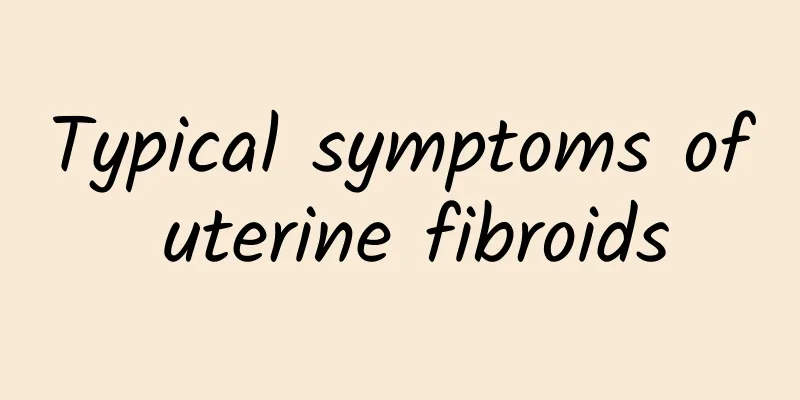What can I eat to relieve dysmenorrhea? Can it be relieved after giving birth?

|
I have a friend in my circle of friends who does micro-business, and he definitely won’t post too much on those days every month. The pain of menstrual cramps is so severe that I can't even straighten my back and feel like my soul is leaving my body. I really want to explode. At this time, my aunts and uncles may say, "The pain will go away after you give birth to the baby." Really? Really? Really? How did I endure all those years before I had the baby? Why does menstruation hurt? Will it get better after giving birth? 1. Causes of dysmenorrhea There are currently three main reasons that may cause dysmenorrhea: Excessive secretion of prostaglandins: Excessive secretion of prostaglandins in the body during menstruation induces strong contraction of uterine smooth muscle and causes menstrual cramps. Generally, the pain will be more intense in the first 1-2 days of menstruation, and then the symptoms will gradually subside; Secondary dysmenorrhea caused by gynecological diseases: such as pelvic inflammatory disease, cervicitis, uterine fibroids, endometriosis, etc.; Some studies also believe that it is related to high-sensitivity C-reactive protein: high-sensitivity C-reactive protein is a non-specific marker of the acute phase of systemic inflammatory response synthesized by the liver. The more it is, the more likely you are to suffer from dysmenorrhea and other inflammatory problems. 2. After giving birth, it is possible that the pain will no longer occur. But in fact, only some people do. The following two situations will stop the pain after giving birth: Some young women experience dysmenorrhea because menstrual blood cannot be discharged smoothly from the body. Often, the pain stops after the menstrual blood flows out. Dysmenorrhea is caused by the accumulation of menstrual blood due to congenital retroverted uterus, uterine flexion or abnormal position. The entire process of pregnancy and childbirth can help improve the above two situations, and dysmenorrhea will stay away from you. However, some women have more severe dysmenorrhea after giving birth, or they did not have dysmenorrhea before but started to have dysmenorrhea after giving birth. This is because: no matter which method of delivery, it is possible to cause adhesion of the cervix or the uterine cavity, which can easily lead to poor menstrual blood discharge and cause secondary dysmenorrhea. What a pitfall! Only food can heal a broken heart... The pain is so severe that I can collapse... What can I eat to make it better? 1. Hot water, brown sugar water, and brown sugar ginger tea are all good to drink They mainly act as placebos, and only provide short-term relief after drinking. They are not very effective for women with severe dysmenorrhea. 2. Take medicine as prescribed by your doctor, the side effects are not that scary Regarding the side effects of painkillers, it is foolish to talk about toxicity without considering the dosage. For women with severe dysmenorrhea, painkillers may be the closest straw you can grasp. There are two common medications that can relieve menstrual cramps. ① Nonsteroidal anti-inflammatory drugs This is the most commonly used first-line drug, such as aspirin, ibuprofen, naproxen, flufenamic acid, indomethacin, etc. The side effect is mainly irritation to the gastrointestinal tract. ②Short-acting oral contraceptives It is considered a Class II drug for patients with dysmenorrhea. Studies have shown that oral contraceptives are effective in treating primary dysmenorrhea in up to 90% of patients. The mechanism of action of these drugs may be: By inhibiting ovulation, reducing the estrogen content in the blood, and lowering the levels of prostaglandins, vasopressin and oxytocin in the blood, it can inhibit uterine activity. PS: Don’t buy the wrong one. Short-acting oral contraceptives are different from emergency contraceptives. They are not suitable for everyone, so consult a doctor to confirm. If you have severe dysmenorrhea, you should see a doctor. It may be caused by a disease. Dysmenorrhea is not something that should be taken for granted. If you don’t want to be tortured by dysmenorrhea every time, you still need to find out the problem and treat it accordingly. |
Recommend
Is whitening of the vulva a symptom of vulvar leukoplakia?
Clinically, the causes of vulvar whitening includ...
How much does it cost to extract uterine fluid?
How much does it cost to extract uterine effusion...
Ketogenic diet for weight loss, fat burning... Dr. Weight Loss: 2 hidden "little stones" behind
The ketogenic diet seems to be the most popular t...
Effective ways to relieve dysmenorrhea in women
Dysmenorrhea is a common disease among women, esp...
There are 7 signs of spinal aging! Do the turn and push against the wall to prevent aging and relieve pain
Do you often suffer from back pain, shoulder pain...
Is grade 1 cervical precancerous lesion serious?
Life is like a big stage, and people are performi...
How to prevent ectopic pregnancy?
In recent years, the incidence of ectopic pregnan...
Can women with cervical warts continue to get pregnant?
Cervical warts are showing a trend of younger age...
What is the malignant transformation of uterine fibroids? What are the symptoms of malignant transformation of uterine fibroids?
What are the malignant changes of uterine fibroid...
What are the harmful effects of abortion? There are 4 major harms
The abortion rate is very high now, but most peop...
What are the hazards of having an abortion for the first time? The first abortion for a woman will cause 3 harms to the body
When talking about abortion, people will feel hor...
Who are the people who are prone to cervical erosion?
Cervical erosion is one of the major diseases tha...
The dangers of ovarian cyst rupture
Risks of ovarian cyst rupture: Speaking of ovaria...
In what aspects of the female body do symptoms of vulvar leukoplakia appear?
Vulvar leukoplakia mainly affects women, with the...
Causes of cervical hypertrophy that need to be taken seriously by female friends
Women should know about the causes of cervical hy...


![[Lazy Pack] How to treat dry skin, fine lines, dullness and dark spots? Nutritionists teach you how to eat the right foods to moisturize and fight inflammation](/upload/images/67dcf5a195815.webp)






